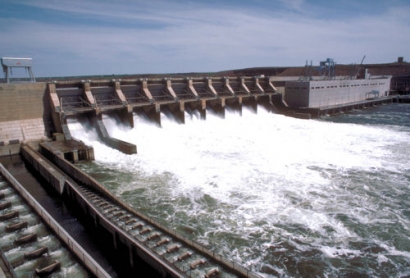
The first in a series of six 45-minute technical webinars, to be broadcast on May 26th 2020, at 11:00 EDT, will inform industry engineers of the best approach to recognizing and solving turbine control and regulation issues.
Presenting a number of case studies where hydro plants have experienced stuck gates, broken shear pins and overloaded servos – all symptomatic of a potential bearing issue – Ryan Edmonds, business development manager at Thordon Bearings, Hydro & Industrial, will offer advice on how to prevent repeated failures and reduce maintenance and replacement costs.
Edmonds explained that turbine regulation is difficult if gates are stuck because of bearing problems. “Not being able to regulate the wicket gates can result in loss of control of the unit, which in turn can lead to more damage, resulting in lost revenue from down time or damaged equipment.
“This webinar will cover many root causes that are often missed, with a technical explanation as to how they might be resolved. This will also include tips that can save time and money. Practical examples will be shared by Thordon experts based on actual experiences seen globally, and solved locally.”
This session is particularly suited to operators of aging power stations, or companies that are offering maintenance and service to these plants. “There can be a lot of misunderstanding relating to bearings and seals, with operators often treating the symptom rather than the root cause of the problem,” he said.
Greg Auger, business unit manager, hydro & clean power at Thordon Bearings, added, “We are bringing more than 30 years of experience in the hydro industry to this series of online technical seminars. The aim is to provide new insight and share our experience of the common challenges, which, hopefully, will help operators reduce downtime and maintenance costs.”
Webinars planned for the 9th and 23rd of June will look at the increasing popularity of self-lubricating materials and water lubricated bearings and how these types of systems can solve a number of common issues encountered by turbine operators worldwide.
“Self-Lubricating bearings have been used since the 1980s, and have continuously evolved and improved, so staying up to date on their latest developments is critical in order to implement the most reliable bearing solutions in a refurbishment or overhaul project,” said Auger.
During the session, Thordon will cover basic tribology principles, including lubricant transfer, comparison against greased bronze, friction characteristics and discuss the differences between wet and dry applications, static versus dynamic motion (stick-slip), and cover practical considerations when using these materials in wicket gates and/or auxiliary equipment.
The third webinar in the series, will review common causes of oil-bearing failures, including design problems, seal performance, and maintenance practices and explain how a well-engineered water lubricated bearing solution can prevent oil/water contamination, oil on the head cover and overloaded oil separators, all of which are problems associated with oil-lubricated turbine guide bearings.
Hydro plant operators can register to attend these free technical sessions by clicking here: Webinar

